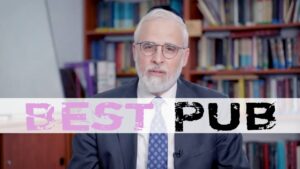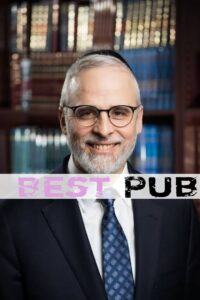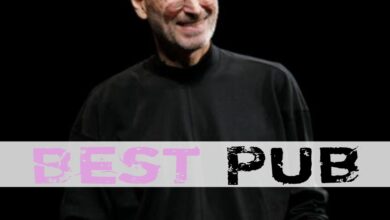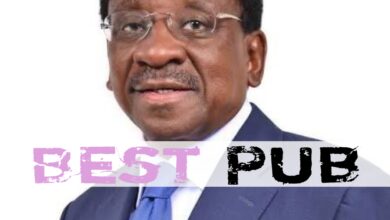Rabbi Moshe Hauer Biography: The Complete Account, Verified Records & Legacy

Rabbi Moshe Hauer was born in 1965 in Baltimore, Maryland. He passed away on October 15, 2025, at the age of 60.
Also Read: Winnie Odinga Biography: The Complete Account, Verified Records & Legacy
He grew up in a strong Jewish community and followed a path of religious learning early in life. He studied at Ner Israel Rabbinical College, where he earned rabbinic ordination and a doctorate in Talmudic law. Later, he received a master’s degree in science from Johns Hopkins University.
Rabbi Hauer began his career as the senior rabbi of Bnai Jacob Shaarei Zion Congregation in Baltimore. He led the synagogue for 26 years. During that time, he focused on education, youth support, and social services. He worked closely with families and helped build a strong, caring community.
In May 2020, Rabbi Hauer became the Executive Vice President of the Orthodox Union (OU). This role made him the public face of one of the largest Orthodox Jewish organizations in the world. He guided religious policy, supported Jewish education, and spoke out on key issues affecting Jewish life.
He also taught Torah widely and mentored young rabbis and leaders. He helped launch leadership programs and was the founding editor of Klal Perspectives, a journal focused on Jewish communal challenges.
Rabbi Hauer was respected across Jewish denominations. He brought people together and inspired many with his wisdom and humility. His work reached far beyond Baltimore and the OU. He became a trusted voice in American Jewish life.
His sudden death on Shemini Atzeret shocked the Jewish world. Tributes poured in from leaders and communities across the globe. Many remembered him as a man of deep faith, kindness, and vision.
Rabbi Moshe Hauer left behind a legacy of service, learning, and unity. His life’s work continues to shape Jewish communities today.
Rabbi Moshe Hauer Early Life and Education
Rabbi Moshe Hauer began his remarkable life in Baltimore, Maryland. This city became the bedrock for his deep commitment to Jewish life and scholarship. He was born and raised within this vibrant community. His early years instilled in him a foundational understanding of Orthodox Jewish values and communal responsibility. His pursuit of knowledge was both intense and wide-ranging. He dedicated himself to rigorous religious studies. This culminated in his achieving Rabbinic Ordination—Semicha—from the renowned Ner Israel Rabbinical College. This institution, a pillar of advanced Talmudic learning in the United States, shaped his approach to Torah study and its practical application. His dedication to scholarship was further recognized when he received the prestigious Doctor of Talmudic Law degree from the same college. This advanced degree confirmed his mastery of Jewish law and tradition, establishing him as a recognized Torah scholar. Rabbi Hauer did not confine his learning to religious texts alone. He demonstrated an impressive commitment to secular education. He successfully earned a Master’s of Science (M.S.) degree from Johns Hopkins University. This achievement showcases his unique intellectual breadth, bridging the world of traditional Jewish scholarship with contemporary academic and scientific thought. His ability to navigate both realms would become a hallmark of his later Jewish communal leadership. This dual educational path prepared him perfectly for his future roles, allowing him to connect with diverse audiences and address complex, modern issues through the lens of timeless Jewish wisdom. His profound commitment to learning became a driving force for all his subsequent endeavors, setting the stage for his decades of service to the Baltimore Jewish community and ultimately, the Orthodox Union (OU).
Rabbi Moshe Hauer Rabbinic Career at Bnai Jacob Shaarei Zion
Rabbi Moshe Hauer dedicated over a quarter-century of his life to a single congregation, serving as the senior rabbi of Bnai Jacob Shaarei Zion in Baltimore. This tenure lasted for an impactful 26 years. It was here that he built a legacy as a quintessential modern pulpit rabbi, focusing intensely on the welfare and spiritual growth of his congregants. His leadership was holistic, extending far beyond the synagogue sanctuary. He placed a significant focus on education, ensuring a vibrant and engaging atmosphere for Torah learning for all ages. Crucially, he pioneered programs directed at some of the community’s most vulnerable members, particularly children-at-risk. He understood that true communal leadership demanded action on pressing social challenges. Rabbi Hauer became deeply involved in local social services, helping to marshal resources and support for those in need. This practical, compassionate approach to Judaism earned him immense respect. His role was not limited to the internal needs of his shul. He was a prominent figure in local communal leadership across the entire Baltimore Jewish community. He worked tirelessly on outreach initiatives, striving to bridge gaps and strengthen the fabric of Jewish life across different denominations and demographics in the area. His deep commitment to his congregants and the wider city positioned him as a recognized and trusted voice, demonstrating the highest ideals of a spiritual leader dedicated to the physical and ethical well-being of his flock. He became a key influencer within American Orthodox Judaism, even before assuming his national role at the OU.
Rabbi Moshe Hauer Leadership at the Orthodox Union (OU)
Rabbi Moshe Hauer transitioned from a respected local leader to a national figure with his appointment as Executive Vice President of the Orthodox Union (OU) in May 2020. This role immediately made him one of the most visible and influential leaders in American Orthodox Judaism. The OU, the largest Orthodox Jewish umbrella organization in the U.S., tasked him with immense responsibilities. He became the organization’s chief rabbinic leader and policy spokesman. This meant articulating the OU’s stance on religious, social, and political issues affecting Jewish life in America and globally. His work was multifaceted, encompassing several critical initiatives. He spearheaded advancements in Torah education programs, aiming to deepen and broaden Jewish learning for adults and youth alike. A core part of his focus was on communal development, offering resources and guidance to synagogues and Jewish institutions across the country. Furthermore, he was heavily involved in advocacy, representing the interests of Orthodox Jewry on Capitol Hill and in the media. He masterfully handled complex issues, drawing on his background as a scholar and a community activist. His leadership was marked by a calm, thoughtful approach, emphasizing unity and collaboration. He sought to apply timeless Jewish principles to contemporary challenges, making him an invaluable voice for the OU. He helped guide the organization’s response to major events, including navigating the complexities of communal life during the COVID-19 pandemic and strengthening its position as a leading voice in Jewish life.
Also Read: Nikitin Dheer Biography: The Complete Account, Verified Records & Legacy
Rabbi Moshe Hauer Teaching and Thought Leadership
Beyond his formal roles, Rabbi Moshe Hauer made a profound impact through his commitment to Teaching and Thought Leadership. He was not merely an administrator; he was a dynamic Torah scholar and an insightful commentator on contemporary Jewish issues. One of his most significant contributions was his role as a founding editor of Klal Perspectives, an influential online journal. This publication provides a forum for in-depth, nuanced discussion on challenges facing the Orthodox Jewish community. His editorial guidance helped elevate the quality of discourse on topics ranging from education and communal governance to social challenges and religious observance. Furthermore, Rabbi Hauer was deeply committed to developing the next generation of spiritual guides. He organized and led crucial leadership training programs for rabbis and communal leaders. These initiatives focused on practical guidance, ethical decision-making, and effective communication, equipping leaders to navigate the complexities of modern synagogue and communal life. His reach extended across the continent through extensive public speaking engagements and Torah lectures delivered across the United States. He was a sought-after speaker for his clarity, erudition, and ability to address pressing issues with compassion and intellectual honesty. His teachings demonstrated how Jewish law and thought remain profoundly relevant to today’s world. This body of work solidified his status as a key intellectual force within American Orthodox Judaism and a leading exponent of authentic, engaged Jewish life.
Rabbi Moshe Hauer Legacy and Impact
Rabbi Moshe Hauer’s legacy is defined by his unique ability to transcend communal and ideological divides, fostering an unprecedented level of unity in American Orthodox Judaism. His influence spanned wide ideological spectrums within American Jewry. He was held in high reverence from both Modern Orthodox and Haredi communities. This rare achievement stemmed from his unwavering authenticity, deep Torah knowledge, and sincere respect for all Jews. His commitment to Klal Yisrael—the entire Jewish people—was evident in every action. His passing led to an outpouring of grief and respect, marked by profound tributes from Jewish leaders and organizations worldwide, including the Jewish Telegraphic Agency and others. These tributes highlighted his role as a unifying figure. He was credited with elevating the national discourse on communal issues, always advocating for thoughtful, informed solutions rooted in Jewish tradition. His work on behalf of children-at-risk and his efforts in establishing platforms for intellectual exchange like Klal Perspectives continue to shape the agenda of Jewish communal leadership. He exemplified the ideal of a modern leader who applied ancient wisdom to contemporary problems, making him a central figure in the recent history of the Baltimore Jewish community and the nation. His impact lies in the way he taught, led, and inspired others to live lives of deeper commitment to Torah, community, and ethical action.
Rabbi Moshe Hauer Passing and Community Response
The Jewish world was stunned by the news of Rabbi Moshe Hauer’s sudden death on Shemini Atzeret, which occurred on October 15, 2025. He passed away tragically at the age of 60. The timing, on a major Jewish holiday, added a layer of shock and sorrow to the already devastating loss. The swiftness of his passing prompted immediate and widespread communal mourning across the globe. Numerous Jewish media outlets, including the Jewish Telegraphic Agency and others which tracked the news, reported extensively on the tragedy. The Orthodox Union (OU), where he served as Executive Vice President, was at the forefront of this communal response. The OU released heartfelt memorials and tributes, reflecting on his life and immense contributions to the organization and the wider Jewish world. Leaders and institutions from every corner of the Jewish community—from the most traditional centers of learning to secular organizations—offered profound reflections on his life. These tributes consistently emphasized his warmth, his intellect, his capacity for unity, and his tireless work ethic. His passing was felt keenly in his home base, the Baltimore Jewish community, where he had served for decades. The response demonstrated his wide-reaching influence, confirming his role as a pillar of American Orthodox Judaism whose loss created a vacuum in leadership and mentorship that will be difficult to fill.
Rabbi Moshe Hauer Age
Rabbi Moshe Hauer Age was 60 at the time of his passing. He was born in 1965.
Rabbi Moshe Hauer Wife
Rabbi Moshe Hauer Wife was Rebbetzin Mindi Hauer, a respected educator and community leader in Baltimore.
She served as a faculty member at WITS (Women’s Institute of Torah Seminary) and worked alongside Rabbi Hauer during his 26-year tenure at Bnai Jacob Shaarei Zion Congregation. Together, they were deeply involved in Jewish education and communal service.
Rabbi Moshe Hauer Children
Rabbi Moshe Hauer Children include several sons and daughters, though their names and exact number are not publicly listed. He and his wife, Rebbetzin Mindi Hauer, raised their family in Baltimore, where they were deeply involved in Jewish education and community life.
Rabbi Moshe Hauer Family
Rabbi Moshe Hauer came from a deeply rooted Jewish family in Baltimore, Maryland. He and his wife, Rebbetzin Mindi Hauer, built a home centered on Torah, education, and community service. Together, they raised several children, instilling in them the same values of faith, learning, and kindness that defined their own lives.
The Hauer family was known for its warmth and hospitality. Their home was a gathering place for students, congregants, and guests from all walks of life. Rebbetzin Mindi played a vital role in Jewish education, teaching at the Women’s Institute of Torah Seminary (WITS) and supporting her husband’s leadership both in Baltimore and later at the Orthodox Union.
Also Read: Pankaj Dheer Biography: The Complete Account, Verified Records & Legacy
Their children grew up immersed in Jewish tradition and community involvement. While Rabbi Hauer’s public work reached national and global audiences, his family remained his foundation and greatest source of pride.
Rabbi Moshe Hauer Profile Table

| Profile | Information |
| Rabbi Moshe Hauer career | Executive Vice President of the Orthodox Union (OU); Rabbi Emeritus of Congregation Bnai Jacob Shaarei Zion (served 26 years); Founder and editor of Klal Perspectives. |
| Rabbi Moshe Hauer real name | Moshe Hauer |
| Rabbi Moshe Hauer age | 60 (at time of passing) |
| Rabbi Moshe Hauer date of birth | Not known |
| Rabbi Moshe Hauer net worth | Not known |
| Rabbi Moshe Hauer wife / spouse | Rebbetzin Mindi Hauer |
| Rabbi Moshe Hauer children (list if available) | Children and grandchildren (specific number/names not widely publicized) |
| Rabbi Moshe Hauer parents (list if available) | Not known |
| Rabbi Moshe Hauer religion | Orthodox Judaism |
| Rabbi Moshe Hauer state of origin | Maryland (raised in Baltimore) |
| Rabbi Moshe Hauer alma mater | Ner Israel Rabbinical College; Johns Hopkins University |
| Rabbi Moshe Hauer education | Rabbinic Ordination (Semicha); Doctor of Talmudic Law (Ner Israel); Master’s of Science (M.S.) (Johns Hopkins University) |
| Rabbi Moshe Hauer nationality | American |



